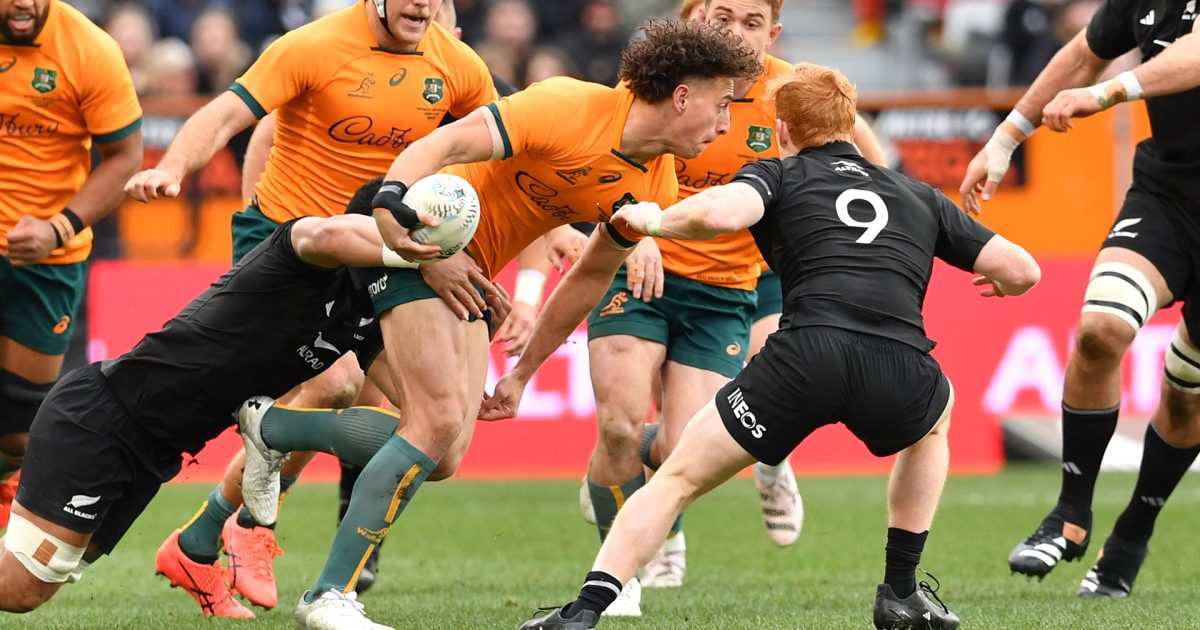The stat that explains the Wallabies' improvement in Bledisloe 2

The Wallabies kicked off Bledisloe 2 with their most impressive 30 minutes of the year so far, surging out to a 17-3 lead just 22 minutes into the match. The All Blacks slowly turned the match around and a clutch penalty kick from Richie Mo’unga sealed the comeback win but those first 30 minutes were enough to raise a few eyebrows ahead of the World Cup.
Eddie Jones’ selection experiments have uncovered a physical pack with plenty of youthful enthusiasm among the veteran leadership.
That physicality put the Wallabies on the front foot early against the All Blacks, winning territory and building plenty of pressure both on the scoreboard and at set piece.
Dissecting what contributed to the Australians’ early success, James Parsons found plenty of positives but one statistic in particular caught the analyst’s eye.
“The team that wins this World Cup is going to have to be really strong at set piece,” Parsons told the Aotearoa Rugby Pod. “That’s where they disrupted the All Blacks and nailed their own stuff early.
“They were big in the collision and the breakdown area. When you say collision, it’s the strong carry and/or defensively you’re winning that collision. Not so much the breakdown, that will be taken care of by what happens in that carry/tackle area.
“The stat that will interest you most about the Australians, it is the most offloads they’ve had in a game, I think in say 12 months. It was purely because the easiest way to offload is winning the contact area and then you can free your arms.
“If you don’t win that contact and then throw the offload it’s just bubbling around and a waste of time.
“So I thought that was interesting as that just showed how dominant they were in the first 30 minutes.”
The Wallabies are rich in their supply of strong ball carriers, with Rob Valetini often leading the charge with youngster Angus Bell not far behind. In the Dunedin Test, Nick Frost, Pone Fa’amausili and Tom Hooper also each contributed double-digit carry numbers while newly named captain Will Skelton contributed six carries in his cameo off the bench.
It was Mark Nawaqanitawase who threw the most offloads in the match with Bell also handing out two of his own.
The podcast’s panel concluded the collision dominance in that opening period shows plenty of promise and will build plenty of confidence in Eddie Jones’ squad heading into the World Cup.
The challenge will of course be turning that 30-minute performance into an 80-minute one under the bright lights of France.
The Australians play France in their final World Cup warm-up match before taking on Georgia, Fiji, Wales and Portugal in Pool C. Whether that handful of matches is enough for Eddie Jones and co to get this team firing for those full 80 minutes, only time will tell.





























sure australia improved but foster gave them a hand by resting lots of players as well
Last time I checked rugby was an 80-minute game.
30-minute dominant periods or 'plenty of promise' and 'youthful enthusiasm' does not guarantee success in test rugby.
No team can consistently sustain that intensity throughout the duration of a test match. Not even France and Ireland (the exception being France vs England in this year's 6 Nations).
They dominated the first half but didn’t score enough points. They should have had another 10 to 15 points for that dominance. The Wallabies have got plenty of improvement in them and they need to be scoring more points. They should have put that game away in the first half but couldn’t. It will come the more that backline plays together. Koroibete and Mark N need to be finishing more rather than starting breaks. You see Mark come into the centre field and often breaks tackles and a lot of players just rubber neck. The big difference last game was McReight backs everything up but we need the backs doing it as well. The Wallabies could be much more lethal if guys can play heads up more and push themselves when there’s a sniff.